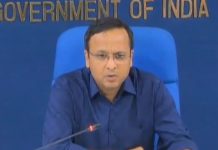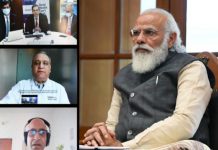On March 19, Hurriyat (G) chairman Syed Ali Shah Geelani dramatically announced the appointment of his long time protégé Mohammad Ashraf Sehrai as the new chief of his party Tehreek-i-Hurriyat. This is the first time that the leadership of any party has changed hands in the separatist political camp and assumes profound significance as it is the patriarch Geelani who is making the way for one.
 But this hardly means that Sehrai is Geelani’s successor. For Tehreek-i-Hurriyat is only one of the constituents of the Hurriyat (G), the powerful separatist alliance, of which Geelani is the lifetime chairman. But by Sehrai’s election as the TeH head, he has become the most favourite candidate to succeed Geelani in Hurriyat (G) too – should such an occasion arise in future, that is.
But this hardly means that Sehrai is Geelani’s successor. For Tehreek-i-Hurriyat is only one of the constituents of the Hurriyat (G), the powerful separatist alliance, of which Geelani is the lifetime chairman. But by Sehrai’s election as the TeH head, he has become the most favourite candidate to succeed Geelani in Hurriyat (G) too – should such an occasion arise in future, that is.
Sehrai is 78, a decade younger than Geelani and also boasts of being the senior-most after his mentor. The two have been together since 1959 when Geelani brought Sehrai from his village in Kupwara to head a madrassa in Sopore, Geelani’s hometown. And more importantly, the two are ideologically aligned, seeking merger of Kashmir with Pakistan through the implementation of United Nations Resolutions. Both have clambered through the ranks in politico-religious outfit Jamaat-e-Islami. But in 2004, the two split from Jamaat after the latter refused their request to play a more active role in the separatist movement and founded Tehreek-i-Hurriyat.
A year earlier, Geelani had broken away from the then Hurriyat Conference and formed an alternative alliance of the separatist parties called Hurriyat-Geelani or Hurriyat (G). Here again, Sehrai was with him. But all his life, Sehrai has preferred to work under Geelani’s shadows and it is only now that he is stepping out into the limelight. And in his first statements, he has not shied away from asserting his leadership and making some bold statements about the prevailing situation in the state.
For example, Sehrai was forthright in his condemnation of the ISIS and Al Qaeda, saying Kashmir had nothing to do with any organization plying a global agenda. “Daesh (ISIS) and Al-Qaida have nothing to do with our movement and we will never accept them,” Sehrai had said. “Those raising ISIS flags are strengthening the roots of occupation in Kashmir. New Delhi directly benefits by this. These youth tell the world that we are extremists and deserve to be killed.”
He even took a position against Zakir Musa, the chief of Ansar Gazwat-ul-Hind, an Al Qaeda affiliate. “Zakir Musa is the light of my eyes. He left everything for the sacred cause. But I want to tell him that by moving towards extremism he was doing India a favour.” Statements like these have gone viral on social media in the Valley and have generated a contentious debate for and against the role of global jihadi groups in Kashmir.
But the real significance of Sehrai’s takeover of TeH lies in the passing of the leadership baton – albeit still at the party level. Succession in separatist circles has always been a ticklish issue. More so, that of Geelani who is arguably the most powerful pro-Pakistan separatist leader. The ailing hawk has now relinquished the leadership of his party but it wouldn’t make much difference as long as he remains the head of the Hurriyat amalgam. Also, in the appointment of Sehrai, he has ensured that a potential new leader at the helm is informed by his ideological outlook. And this would mean perpetuation of a hardline political stance on Kashmir.
Geelani’s approach over the years has become more rejectionist. He is for dialogue with New Delhi but before that wants the Centre to acknowledge Kashmir as a disputed territory and also seeks involvement of Pakistan as a party in a trilateral process, with Kashmiris as the main party to the dispute. And to top it all, he also rejects any new settlement proposals on Kashmir which detract from the implementation of the UN resolutions on Kashmir. And for this very reason, he had opposed the former Pakistan president Pervez Musharraf’s four point formula on Kashmir.
The proposals unveiled by Musharraf in 2006 had set out a four stage incremental process for resolution of the Kashmir territorial dispute. The steps were: identification of the regions in Kashmir for solution, demilitarization, self-governance and a joint management or a consultative mechanism between India and Pakistan on the state.
There are a good number of people in the Valley who sympathise with Geelani’s stance. And to some, he sounds increasingly impractical. Geelani’s rigidness is seen as rooted in history. Being the last of the major political leaders in Kashmir of the 1947 stock, Geelani still connects Kashmir to partition while the world has moved on. And with Sehrai in charge, little is going to change. And he makes no bones about it. “Let me be clear about one thing if people think our stance may change by appointing me as TeH head, then they are wrong,” Sehrai told a local daily in an interview. “Our stance will never change come what may. We believe Kashmir is a dispute and it should be resolved according to the aspirations of its people. We will not hold any dialogue until or unless India is serious about it.”
Sehrai has also been dismissive of the interlocutor Dineshwar Sharma. “By appointing the so-called interlocutors New Delhi is just buying the time. Tell me what kind of dialogue is this that Dineshwar Sharma is going to far-flung areas and people are telling him that we are without electric transformer? Isn’t this a joke? They can’t befool us,” Sehrai said. “Tell me did Sharma’s appointment as interlocutor make any difference? People are being killed, blinded and tortured every day. This is a futile exercise”.
And like Geelani, his only solution for Kashmir is the grant of right to self-determination to the people. “People should be allowed to decide their fate as promised by the Indian leaders,” he said. “The issue should be resolved according to the will and aspiration of Kashmiri people that is acceptable to all otherwise there will be no compromise”.
As these statements make amply clear, were Sehrai to succeed Geelani as the Hurriyat chairman, it will make little difference to the grouping’s approach towards New Delhi or to the resolution of Kashmir. It will almost be like Geelani succeeding Geelani.
letters@tehelka.com













